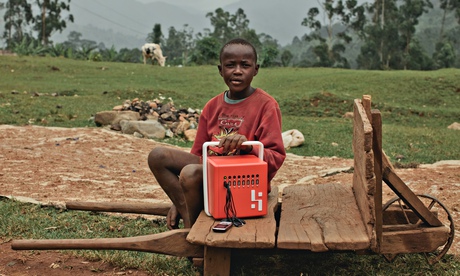
Over the past decade, mobile phone use in the developing world has rocketed, but in many areas it is difficult to find power to charge them.
Since 2010, Buffalo Grid has been working to bring cheap electricity to rural communities in Uganda, where 80% of the population owns mobile phones but only 5% has access to power. At present, many people travel to the nearest town twice a week to charge their phones; the journey can take up to half a day and has a considerable cost.
After a prototype of bicycle-powered generators failed, Daniel Becerra, Buffalo Grid's managing director and co-founder, came up with a new device: a portable, quick "mini power station" that charges up to 24 phones at a time using solar energy. Charging takes the same time as a wall socket.
Becerra's background is in industrial design and engineering. After studying in Mexico and running his own design consultancy, he attended Imperial College, where he was part of a team that developed a substitute for air-conditioning that gave 90% of the efficiency with 5% of the consumption.
Buffalo Grid, named after buffalo charges, has so far set up five machines in Uganda, given free to local entrepreneurs who guard the phones while they charge. The machines have been distributed to an existing network of coffee farmers, who have worked for decades with Becerra's co-founder, Phil Schluter, a coffee trader.
Becerra says the project's main innovation lies in its distribution model: people pay by sending a text message (roughly 10p, the market rate) and then plug their phones into the nearest grid. "This allows you to claim your revenues remotely, and have a much lower running cost that allows you to offer an affordable service."
Mobile phones are vital for people in developing countries, whether for trading, safety or general communication. The UN, where Becerra presented the project earlier this year, identifies the mobile phone as the biggest contributor to economic growth in off-grid areas.
"Mobile phones are really changing the game: they improve quality of life and business activities. If you need a doctor or you've been robbed, you need a phone," Becerra says. "You hear stories of users who would sacrifice their quality of food just to get airtime and a charge for their phones."
Mobile phone charging is the machine's main use at the moment, but it can also be used for rechargeable lights. Buffalo Grid is about to launch a pilot in India and the ultimate goal is reaching the 1.2 billion people in the world who live without electricity.
Becerra's favourite part of the project has been discovering Uganda: "I'd never been to sub-Saharan Africa before. I was quite apprehensive – in the news you only hear bad things – but once you go you realise how magical it is. People live very pleasant lives and the environment is incredibly beautiful. It's not all doom and gloom."

